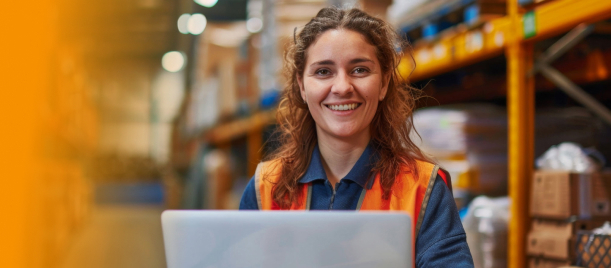The past two decades have witnessed the rapid spread of globalization, as countries have seized the benefits of global trade and strived to foster relations with multiple partners worldwide. Organisations like the WTO played a vital role in ensuring a level playing field for developing countries, through the rationalization of tariffs and advocating for free trade.
Global corporations and large importers built their businesses on the back of globally dispersed supply chains, spanning a vast network of suppliers in several countries. It is crucial to understand and comply with the regulations and standards of all countries involved in the supply chain, as each country may have unique legal requirements. Every business owner, regardless of company size, is responsible for understanding and managing trade compliance regulations to mitigate legal and financial risks.
Traditional Role of a Compliance Officer in Global Trade
While multinational corporations dealing with physical products usually have a larger customs footprint, the presence of a structured trade framework governed by a set of globally accepted rules and processes meant that trade compliance and regulatory landscape was not prone to unexpected and rapid changes.
Therefore, business decisions were primarily based on commercial factors, while trade compliance, although important, was not given significant weight, as settled regulatory, procedural, and documentary requirements did not pose exceptional difficulties in designing supply chains.
The basic role of the trade compliance officer in this situation was to monitor import and export movements, ensuring that goods were properly exported and that importing activities complied with all relevant regulations, legal requirements, and standards.
Ergo, the trade compliance officer was perceived as a support function, whose role was largely restricted to adhering to standard operating procedures, ensuring efficiency and accuracy during the international movement of cargo.
Eroding Supply Chain Stability Due to Export Control and Disruption
Since the formation of the WTO in 1995, tariff levels have been declining, with tariffs applied by WTO members almost halving since 1996. The reduction in tariffs and simplification of their structure has helped smoothen international trade and mellow down the complexities of trade compliance.
Over the past few years, however, a series of disruptive factors have severely undermined the reliability of supply chains and existing procurement models. Frequent tariff changes have made trade compliance increasingly challenging to work through. This impact has been magnified by several geopolitical events that have occurred in immediate succession, giving global supply chains little time to recover from the shock.
In recent years, the pandemic compelled countries and corporations to diversify their sourcing networks to reduce the risks associated with overreliance on a single source. As a result, trade compliance officers have had to broaden their expertise, staying up to date with regulations and procedures across a wider range of countries.
Trump’s tariffs have been the latest in a series of disruptive factors, upending the relatively stable international trade environment that had prevailed since the early 2000s. Besides the latest tariff levels and exemptions, trade compliance officers also need to identify each component of their products and track the source. It is crucial that each component is accurately identified to ensure proper classification and compliance with relevant regulations.
In addition, varying tariff rates across trading partners and exceptions for certain essential commodities have added complexity to sourcing decisions. Trade compliance officers must now assess the most cost-effective sourcing locations while maintaining clear visibility into the origin of each component to ensure customs compliance and avoid tariff overpayments. Since requirements and risks vary depending on country and product, staying informed of specific, ever-changing regulations is essential.
Businesses have legal obligations to obtain necessary permits and comply with export legislation as part of export controls and customs compliance. Failure to meet these obligations can result in other penalties, such as financial sanctions, delays, or even criminal consequences.
Trade Compliance Officer as a Strategic Navigator
Trade compliance officers are now recognized as key strategic navigators within their organizations, responsible for ensuring compliance with international trade regulations, export controls, and trade compliance regulations. Their expertise in relevant laws, including those governing import and export compliance, enables them to guide organizations through complex regulatory environments and identify potential compliance risks before they impact business operations.
What was once a relatively stable role, where responsibilities were primarily restricted to following established procedures for export and import of merchandise, has now assumed critical importance. Compliance officers are now expected to develop and oversee comprehensive compliance programs and control systems to ensure organizational integrity and adherence to laws and regulations.
Expectations from the trade compliance officer have changed, from managing a support function to being a strategic navigator. In addition to their traditional duties, they are now responsible to implement policies and run regular auditing to ensure compliance with all relevant regulations and internal controls.
Today, trade compliance officers play a far more strategic role, staying abreast of frequent tariff changes, country-specific exceptions, and evolving documentary and procedural requirements. They assess regulatory risks, calculate applicable tariffs, and evaluate their impact on total cost of ownership (TCO) and profit margins.
Based on these insights, they recommend sourcing strategies, advise on supply chain reconfigurations, and guide the business to minimize both tariff payments and landed costs — while ensuring full customs compliance. Their responsibilities now span the entire trade lifecycle, covering both export and import compliance, and navigating complex regulatory requirements across multiple jurisdictions.
In short, the trade compliance officer now drives commercial decisions and steers the organization towards success in these turbulent times. They play a crucial role in maintaining corporate compliance, and holding certified compliance credentials such as CCEP or CHC can add significant value and credibility to their position.
Leverage KlearNow to Navigate Trade Compliance Regulations
In this quest, technology is the trade compliance officer’s best friend. The magnitude of the incremental complexity renders it beyond human capabilities to evaluate all possible permutations and combinations, and recommend the best strategies, while also increasing the probability of inadvertent errors and the risk of customs violations.
Deploying logtech solutions that automate workflows, digitize documentation, and streamline the overall customs process is the only viable solution.
While the trade compliance officer has several options to select from, depending on the supply chain element that they aim to address, experience suggests that sophisticated solutions that cover the E2E supply chain deliver the best results.
Logtech solutions providers, such as KlearNow.AI, have introduced several such products since the industry’s pioneering days. Building on knowledge and data gathered over the last six years, KlearNow.AI has continually upgraded its products to meet the changing requirements of the logistics and trade compliance industry, achieving exponentially higher accuracy levels.
KlearHub, the AI-powered global trade data hub, has been one of the market leaders in this segment, with customers testifying to its transformative benefits for their customs brokerage and trade compliance activities.
KlearHub does not require complex integration or training, since employees only need to copy KlearHub in the email, and the system then analyzes and ingests the data, automates customs submissions, and eliminates trade compliance errors.
Click here to book a live demo and understand how KlearNow can become your trusted partner.
Frequently Asked Questions (FAQs)
1. What is the role of a compliance officer in international trade?
Compliance officers in international trade ensure that all trade transactions adhere to the legal and regulatory requirements of the countries involved. They monitor import and export activities, manage trade documentation, and help businesses navigate complex customs regulations to avoid penalties and delays.
2. How can companies mitigate risk in global trade operations?
Companies can mitigate risk by conducting regular compliance audits, staying informed about changing international trade regulations, and leveraging technology to improve visibility and accuracy across their supply chains. Using practical solutions like KlearNow’s AI-powered tools helps reduce errors and ensure regulatory compliance.
3. What are the consequences of non-compliance in trade transactions?
Non-compliance can lead to serious consequences, including fines, shipment delays, legal penalties, or even criminal charges. It can also harm a company’s reputation and result in the loss of trading privileges with key partners or countries.
4. How do compliance audits help in managing global trade?
Compliance audits identify gaps in current processes and ensure that internal controls align with relevant trade regulations. Regular audits help businesses proactively detect risks, strengthen compliance frameworks, and maintain credibility with regulatory authorities.
5. What practical solutions are available for simplifying global trade compliance?
Logtech platforms like KlearNow offer practical solutions by automating customs documentation, providing real-time regulatory updates, and streamlining trade transactions. These tools empower compliance officers to focus on strategic decisions while minimizing the risks of non-compliance.

